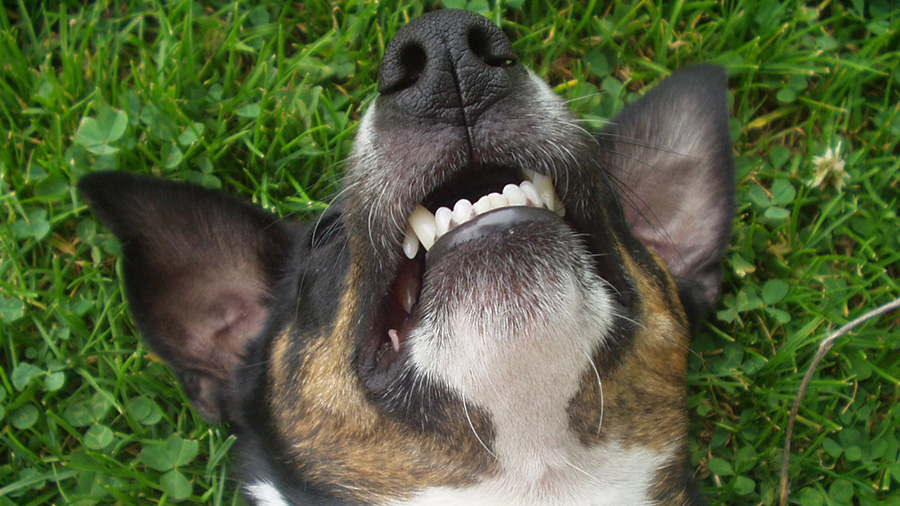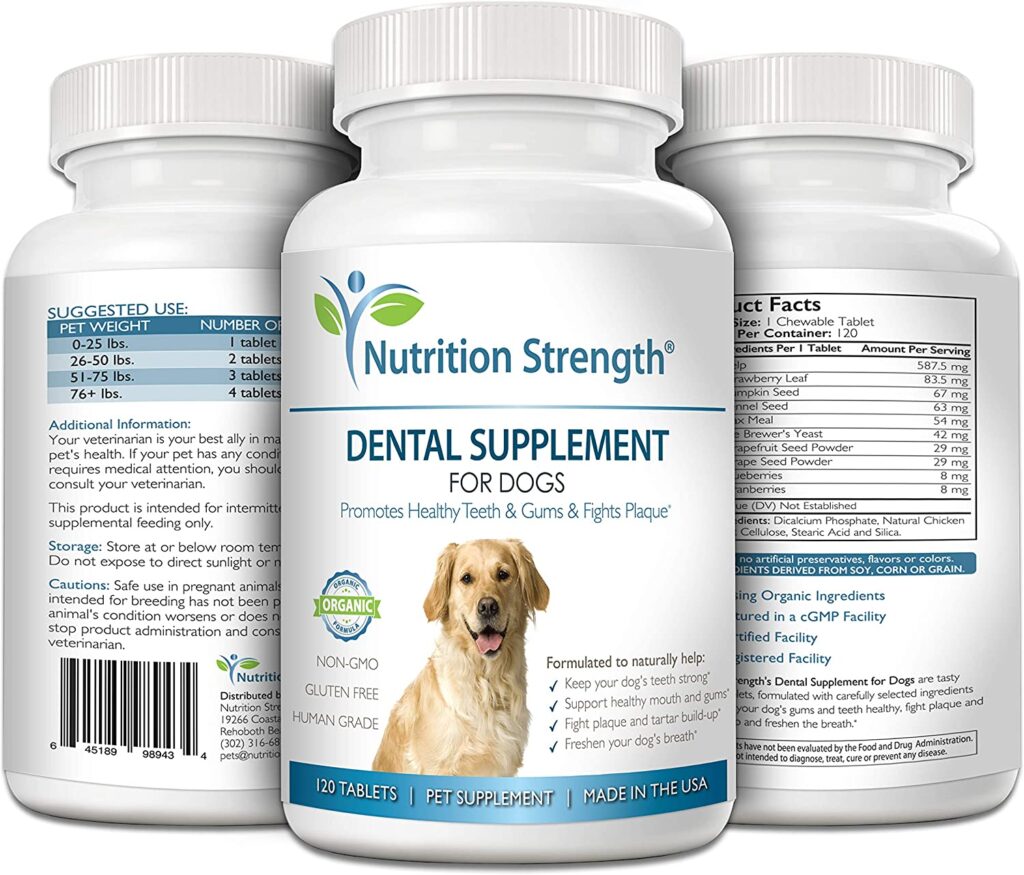Dental Treats for Dogs: What Works for Your Pet
There are many different types of dental treats for dogs and various reasons we offer them to our pets. One argument is that treats may act as “functional foods,” providing health advantages in addition to nourishment.
For example, oatmeal is a functional food with soluble fiber that may help decrease cholesterol levels in dogs. Dental dog food for healthy teeth is a form of experimental dog treatment.
Pet owners commonly purchase these snacks to help clean their teeth and maintain oral health. A recent poll of dog owners revealed that 83 percent utilized goodies daily, with biscuits and dental chews among the most popular.
Our article today explains why dental care is so essential for dogs, how treats may help with oral hygiene, the many kinds of dental treats available and what to avoid.
Table of Contents
- Why Is Dog Dental Health so Important?
- Why Might My Dog Need Dental Treats?
- What Is Plaque?
- Dental Dog Treat Options
- What Are the Benefits of Dental Treats?
- What Else Should I Know About Dental Treats?
- The Takeaway
- Nutrition Strength Dental Care for Dogs
Check out our Nutrition Strength Dental Care for Dogs here.
Why Is Dog Dental Health so Important?
Poorly maintained teeth and gums may lead to a range of problems for our canine companions. Many dog owners feel that foul breath is usual for dogs.
Still, it may indicate more severe dental disorders, such as periodontal disease. Periodontal disease, gum and tooth infection, is one of the dogs’ most prevalent clinical disorders.
Bad breath is one of the first indicators. While the risk of periodontal disease in dogs may grow with age, many dogs exhibit indications by the time they are only three years old.
Periodontal disease is caused by plaque and tartar (calculus) build-up, which causes inflammation and gingivitis (inflamed gums). Tartar build-up and / or gingivitis were seen in 20 percent of dogs of all ages.
Brushing teeth at least three times per week has been demonstrated to be the most effective means of maintaining excellent oral health and avoiding periodontal disease in dogs.
However, many pet owners have difficulty sticking to this routine, which is where dental chews come in. Providing hard chews rather than soft chews has been associated with a lower incidence of dental disorders.
More hard meals and chews that increase tooth contact and chewing time have been demonstrated beneficial in removing plaque and cleaning teeth by abrasive action. However, there is no proof eating kibble may prevent oral problems.
Why Might My Dog Need Dental Treats?
Dog teeth cleaning chews are a simple approach to encourage your dog’s healthy teeth and gums.
Regularly brushing your dog’s teeth is a good idea, but it may be difficult. So dental treats are a direct approach to helping to keep your dog’s mouth fresh and clean.
Dental chews may be given to your dog regularly, like brushing, but much tastier. A dental chew may help keep your dog’s teeth free of plaque, tartar and other unpleasant things.
What Is Plaque?
Plaque is a bacterial coating that forms on teeth. If the bacteria is not removed, it multiplies and causes various tooth disorders. A significant plaque build-up can ultimately harden into tartar, which may cause diseases such as:
- Gingivitis: bad breath is generally an early sign of gingivitis, as is a build-up of yellow tartar. If gingivitis is not treated, a dog’s gums may enlarge and eventually lose teeth.
- Periodontal disease: gingivitis may progress to periodontal disease if not addressed. A dog’s gums will recede, creating a hole between the tooth and gum that might get infected.
- Abscesses are caused by a build-up of pus on one or more teeth, resulting in swollen and reddish gums. This may be highly uncomfortable, so frequently examine your pet’s mouth for plaque and tartar build-up symptoms.
Dental Dog Treat Options
These particular treats do not take the place of regular cleanings and dental care for dogs, but they are simple and handy.
These are far more likely to be appreciated by your dog than having a toothbrush shoved in their mouth. So let’s see which are the best dental treats for dogs.
Specialty Dental Chews
These specialty chews are carefully created to be practical, delicious, playful and simple to digest. They are soft enough not to harm teeth yet firm enough to help clean them.
Several studies have shown that giving dogs a daily dental chew reduces plaque, tartar and gingivitis.
Dental chews have even been demonstrated to help eliminate foul breath. Furthermore, multiple studies have established that the oral hygiene advantage of these chews is related to their abrasive mechanical action.
That shows that adding antimicrobial agents, such as chlorhexidine, has not enhanced tooth health any further.
Nonetheless, antimicrobials and calcium chelators (binders) meant to suppress tartar development are still offered in products.
To encourage fresh breath, you may also notice other health-related additions such as vitamins or mint, dill, parsley or fennel.
Bully Sticks and Jerky
Bully sticks are another form of dog teeth cleaning treats. They are easily digestible, do not splinter and are often comprised entirely of high-protein beef muscle.
These sweets are delicious and may help oral health by mechanically scraping plaque. Similarly, jerky is a rougher chew that may help clean your dog’s teeth. However, be sure to obtain high-quality dog jerky that contains no additives.
Rawhides
While rawhides are generally not suggested owing to some dogs’ digestion concerns and the possible choking danger, they have been demonstrated to help oral health.
One research found that giving dogs a soft fibrous rawhide regularly decreased plaque, tartar and gingivitis.
Further investigation found that feeding up to three rawhide strips daily for three weeks straight caused no problems.
That was an efficient technique for removing plaque and tartar from canine teeth. Rawhides’ collagenous fiber matrices help in more effective teeth cleaning.
Rawhides and pigs ears do not work for every dog, but some dogs tolerate them well; just keep an eye on them as they chew.
When feeding rawhide, keep in mind that it is an animal component and so contains a lot of calories. It’s also critical to select a reputable supplier for your rawhide snacks since recent batches have been proven to be infected with Salmonella germs.
Biscuits
As a stricter treat, biscuits have the mechanical advantage of increasing tooth contact, which may aid in cleaning. Chewing cereal biscuits has been demonstrated to help eliminate dental tartar from dogs’ teeth.
The size and form of the treatment may be customized to encourage more tooth contact and chewing time, which can help scrape plaque off teeth.
Raw Bones
The usage of raw bones is hotly debated. While it has been shown that chewing on raw beef bones reduces tartar buildup in dogs, there are drawbacks such as digestion, splintering and fracturing teeth.
The bone should be given raw and never cooked if fed. Look for “spongy” or non-weight-bearing bones like joints, ribs and vertebrae rather than “compact” or rigid weight-bearing bones like marrow and leg, which can cause tooth fractures.
Crispy Fruits and Vegetables
Apples are a healthy food that you may share with your dog. Because of the additional chewing necessary for this snack, they may also assist in cleaning your dog’s teeth.
Carrots, celery and other vegetables may also produce nutritious tooth-cleaning snacks.
What Are the Benefits of Dental Treats?
Dental treats for dogs are an excellent addition to your pet’s favorite chews. That is because they help you maintain your pet’s dental hygiene while providing a delightful reward.
You may notice that dental chews have a peculiar form and feel. Each type feature a specific format to keep teeth clean and plaque at bay.
These goodies can reach places in your dog’s mouth that you would not be able to get otherwise.
So, what are the benefits of dental treats for your dog? Regular teeth cleaning should be on your pet’s schedule to prevent plaque build-up.
Dental chews may be provided daily to freshen your pet’s breath and stimulate plaque and tartar breakdown.
These are just a few of the symptoms of plaque build-up, which, if ignored, may lead to other, more severe problems:
- Tooth loss.
- Inflamed gums.
- Bad breath.
- Discolored teeth.
Check your dog’s teeth and mouth regularly for these signs. Schedule an appointment with your veterinarian if you find your dog is losing teeth or has very terrible breath. This might indicate a more serious underlying problem, such as gingivitis.
Your veterinarian may also recommend the best next steps to address your pet’s oral hygiene concerns. Examples are professional cleaning and items you can integrate into your four-legged friend’s routine, such as brushing and dental treats.
What Else Should I Know About Dental Treats?
Check the contents of dental treatment, mainly if you will feed your dog a chew daily. You must stick to higher-quality and vet-recommended dog dental chews.
That is important to guarantee your pet’s daily treat does not contain too much sugar. Many chews contain cereals, so if your pet is intolerant, you should look for cereal and grain-free treats.
If your dog is a rapid chewer, be careful since chewing a dental chew too quickly or swallowing bits of it whole might result in choking or obstructions.
If you’re worried about your dog’s eating habits, offer them chew pieces in little amounts throughout the day.
Keeping your pet’s favorite dental treats on hand and regular teeth cleaning and brushing helps guarantee that your pet has fresh breath and healthy teeth and gums for the rest of their life.
The Takeaway
Every puppy enjoys dental treats for dogs. When it comes to munchies and chews, our four-legged companions are spoiled for choice, whether it’s a gourmet chew bone or a delectable duck bite.
While offering our dogs treats occasionally is lovely, they are typically just that — treats. So it is fantastic when we can offer our dogs something that not only tastes good but also helps keep their teeth and mouths clean. That is the best way to support critical dental hygiene.
Nutrition Strength Dental Care for Dogs
Check out our Nutrition Strength Dental Care for Dogs here.
Dental Care for Dogs, Daily Supplement for Healthy Dog Gums and Teeth with Organic Kelp, Strawberry Leaf, Pumpkin Seed for Dog Mouth and Teeth Cleaning are premium chewable tablets, which are specifically formulated with ingredients that promote healthy teeth, gums, fresh breath and fight plaque for dogs of all ages.
A tasty formula for dogs of all ages to support their teeth and gums, our delicious dog dental chews contain a special blend of high-quality ingredients to promote dog dental care by:
- Delivering vitamins and minerals needed to break down the film covering the teeth and gums.
- Softening accumulated plaque and tartar until after a few weeks’ time of use it falls off by itself or you can brush it off with a toothbrush.
- Maintaining healthy dog gums and freshening your pet’s breath.
- Supporting microbial balance in the mouth.
- Reducing future plaque and tartar build-up, strengthening the immune system and improving digestion.
Pet teeth cleaning is essential for preventing plaque and tartar build-up and keeping your dog’s teeth in good condition and our premium dog oral care supplement makes it simple and fun.
Used daily, our specially-made dental treats for dogs promote healthy dog gums and teeth, to assist your pet’s long-term active and healthy lifestyle.
Image source: Wikimedia / Rachel329.




